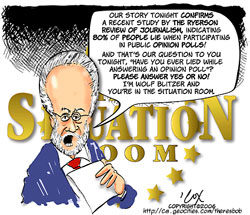Fork in the road
Is it time for Pitchfork to choose considered opinion over snark in its music criticism?
On June 15, 2004, the online music magazine Pitchfork published a review of the Beastie Boys’s 2004 release, To the Five Boroughs. It was written by Brent DiCrescenzo, one of the site’s regular contributors. More than 2,000 words in length, the actual CD review was buried under a disjointed and confusing chronology that moved between Milan and Manhattan over a period of about five years. The writer’s tone went from angry (when describing what were later revealed to be made-up experiences with the band’s publicist) to nostalgic (when reflecting on where he was in life when listening to each Beastie Boys album as it was released). He signed off by bidding farewell to his career as a music writer. “This process has become uninteresting and routine,” he wrote.
In addition to having little to do with the CD in question, DiCrescenzo’s review contained false information. Less than a week after the post, Pitchfork issued a retraction, advising its readers of inaccuracies. The piece has since been revised, but the original, as well as Pitchfork‘s statement, can be found on any number of blogs and message boards, along with comments expressing glee at Pitchfork‘s mistake (“As we read this, we emit low, mordant chuckles,” wrote Marc Hogan, blogger on Whopundit, on June 22, 2004.) The review was named one of 2004’s worst pieces of music writing on rockcritcs.com. “Even the retraction that Pitchforkhad to print after this was better than this article,” wrote Jason Gross, editor of online music magazine Perfect Sound Forever.
Pitchfork is frequently the subject of scorn among readers – and writers – of music criticism. In describingPitchfork editor Ryan Schreiber’s news story about the success of Bright Eyes’s recent singles, Globe and Mail columnist Carl Wilson wrote: “His curdled incredulity was consistent with Pitchfork‘s tone toward all culture tainted by mass popularity, with the old indie habit of retreating behind concentrically embedded moats of sarcasm.” Robert Christgau, longtime music critic at The Village Voice, referred to writers for bothPitchfork and Pop Matters (another popular online magazine) as “tyros opining for chump change,” in his article “A History of Rock Criticism,” for Columbia University National Arts Journalism Program.
In part, the critical reaction reflects the site’s growing importance in the music industry, with 115,000 visitors daily and label scouts checking in regularly for tips on bands. A positive review on Pitchfork is now considered a prelude to commercial success. Advertisers are investing in the exposure Pitchfork offers, which has allowed Schreiber to hire a sales rep. It has also afforded him the luxury of signing on managing editor Scott Plagenhoef, and the site’s content has grown to include frequent reviews of individual tracks and a daily feature story.
Yet it remains to be seen whether Pitchfork will address charges that it is an amateur publication with an immaturely jaded perspective, and become universally accepted as a legitimate source of music criticism.
Plagenhoef, who started as managing editor last fall and previously wrote for the Chicago Sun-Times and various sports magazines, says he wants to raise the bar of professionalism at Pitchfork. Already, he says, the publication is more writer-friendly. “Because Ryan’s not doing everything himself,” says Plagenhoef, “there is more communication among staff. Writers have more input at every level.”
Further, the scope of the site’s coverage has expanded. “It’s not as rock oriented,” Plagenhoef explains. “There’s more noise, folk, metal, jazz. We offer as wide a range as any major publication.” He also believesPitchfork‘s image is changing. “The idea that we’re just a bunch of college kids doing a bunch of creative writing exercises, or that we hate everything,” says Plagenhoef, “those are the kinds of old stereotypes that ideally don’t apply anymore.” He believes the site can maintain an “honest, independent voice” while stripping out the obnoxious snark for which it is known.
Like a teenage boy who believes he alone knows what’s worth listening to, Pitchfork often comes across as elitist and self-involved. Schreiber started pitchforkmedia.com in 1996, when he was 19. “I had a very uncomplicated vision,” he says. “It was me writing record reviews and making a living.” Schreiber had no training or experience in writing, and his first efforts were rough. “Odelay is the third best record of 1996 so far,” wrote Schreiber in June of that year, “and as you all know, there can only be one of those.” Schreiber quickly recruited several more writers, and within its first two years online, Pitchfork developed a feeling of “insider” rebelliousness. Even the positive reviews were smug. Commenting on the fact that Elliott Smith’s 1998 release XO was released by a major label, Mark Richard-San wrote: “The indie cred is probably out the window but the tunes are still there, so trust me, teenagers – everything’s going to be just fine.” In 2002, when Schreiber fell in love with Broken Social Scene’s You Forgot It in People – leading to a review that, according to local legend, catapulted the Toronto band to fame in the U.S. – all he could manage was a backhanded compliment. “No one wants to admit that they like a band that goes around calling themselves this,” he wrote, mocking their artwork, the name of their label, and the dedication of the album to “families, friends and loves” [Schreiber’s emphasis].
While several factors, including timing, were at play in making Pitchfork successful, Schreiber believes honesty is a key ingredient. It differs from other music sites, such as All Music and Better Propaganda, in its lack of publicity-like cheerleading, but cannot claim a monopoly on truth telling, with respected sites like Pop Matters and Stylus also publishing critical reviews. Instead, what sets Pitchfork apart is sassy indulgence. The review of the 2002 release, Static Delusions and Stone Still Days by The Catheters, conjures a list of results for a make-believe search in “Classifieds.com” under “The Catheters,” and tucks its critique of the album into an ad selling it second-hand (the list also includes an ad selling “barely-used medical equipment… no questions asked”).
While Schreiber would do well to be mindful of writing that is too smart for itself – the DiCrescenzo fiasco being Pitchfork make-believe at its worst – he seems to be keeping the spirit of that nine-year-old Beck review alive. Pitchfork‘s review of Guero, the new Beck album, reads like a psychiatric patient history, giving “Mr. Hansen” a diagnosis of Multiple Personality Disorder. It’s a long way from “Odelay‘s no loser,” but full of the same attitude. The “doctor’s” prognosis for Beck is guarded – “it seems likely that what worked for the subject almost ten years ago may not be appropriate at this later stage,” the writer opines.
The same may be true for Pitchfork.











